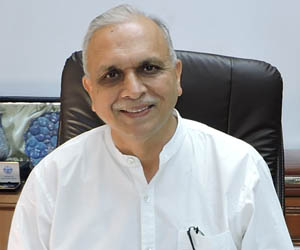The 19th Party Congress of the Chinese Communist Party (CCP) ended on 24 October 2017 with Xi Jinping nominated to lead the party and the country for a second five-year terms. Xi’s name was also inscribed in the party constitution for his contribution to the party thought. This brings him at par with Mao and Deng. The 19th Party Congress saw the emergence of Xi as he most powerful party leader since possibly Mao.
It was reasonably clear to most analysts even before the Party Congress that Xi would face no major challenge to his leadership though there were some speculations that his brutal anti-corruption campaign of the last five years might attract some backlash. But that was not to be.
The standing committee of the Politburo has been substantially renewed. This is contrary to the expectations of many China watchers who were expecting only one or two new additions to the 7-member SC and a contest for only one or two seats. What has emerged is very different. Except for Xi himself and Premier Li Keqiang, all other existing members have been dropped and replaced by five new faces. These are: Han Zheng, Shanghai party leader; Wang Huning, director of the party's Central Policy Research Office; Li Zhanshu, director of the party's General Office who serves as Xi's Chief of Staff; Wang Yang, the Vice Premier; and Zhao Leji, head of the Central Organization Department responsible for personnel department of the party.
The overhaul of the top organs has been thorough. Apart from the standing committee, 15 of the 25 Politburo members has been replaced. Majority members of the 200 plus Central Committee has also been replaced. Thus Xi has a substantially new team to carry out his plan of rejuvenating China, transforming it into a global leader and making China a moderately prosperous socialist society by 2050.
Li Zhanshu (born1950) has occupied many party posts including having been the Director of the General office, Director of the National Security Committee. He has been a full member of the Central Committee since 2012. He was not in the politburo. He has made it straight to the Politburo Standing Committee in 2017. He is considered to be close to Xi.
Zhao Leji (born 1957) has been a member of the Central Committee since 2002 and of the Politburo since 2012. He has been the Deputy Head of Central Leading Group for Party Building Work, and Central Leading Group for Inspection Work.
Han Zheng is the Secretary of Shanghai party committee, a Politburo member since 2012, a full member of the Central Committee since 2002 and is considered to be close to former Chinese leader Jiang Zemin. Could he be from the Jiang Zemin faction and a potential challenger to XI? This will be entering into the realm of speculation.
Wang Yang (born 1955) is the Vice Chairman of the State Council since 2013. He has been a Politburo member since 2007 and a full member of the CCP Central Committee since 2007.
Wang Huning (born 1955) has been the Director of the Central Policy Research Centre of The Central Committee since 2002, Director of The Central Leading Group of Comprehensive Deeping of Reforms since 21013 and a full member of the Central Committee since 2002.
All except one have long experience in party organs and have worked with Xi for the last five years. The only exception is the Shanghai party secretary Han Zheng.
Many would point out that some of the known Xi favourites have been left out and that the composition of the Politburo Standing Committee might reflect a compromise between different factions. Well, the Chinese party system is opaque. It is very difficult to be certain. But the general tenor of the 19th Party Congress has been the inexorable rise of Xi.
Observes have also noted that there is no clear scissor to Xi when he finishes his second term in 2022. This might mean that Xi has left the door open for continuing beyond the customary second term. That, however, remains to be seen.
The take away for India is that Xi is more powerful than before. He is also a diehard communist. He believes in party supremacy and socialism with Chinese characteristics. He has outlined a roadmap of China’s rejuvenation right up to 2050 which very few leaders in western style democracies dare do.
Xi’s influence on the global relationships will be palpable. During his second term he will be even more determined to pursue China’s rise as a global power and set the global agenda. Already many actions have been taken by him like launching the Belt and Road Initiative to enhance China’s global influence. In times to come Chinese Yuan will challenge the global dominance of dollar as a global currency. Xi has also announced that China will be a major technological power because in this area it has to do considerable catching up with the West. He is expected to continue with strengthening the People’s Liberation Army (PLA). Xi would make no compromises in sovereignty related issue. India will need to factor that into account because of the standing boundary question between the two countries.
Overall India will have to deal with a stronger and more determined China under Xi.
(Views expressed are of the author and do not necessarily reflect the views of the VIF)
Image Source: http://images.newindianexpress.com/uploads/user/imagelibrary/2017/10/24/original/2017-10-24T112127Z_2_LYNXMPED9N08Y_RTROPTP_4_CHINA-CONGRESS.JPG










Post new comment